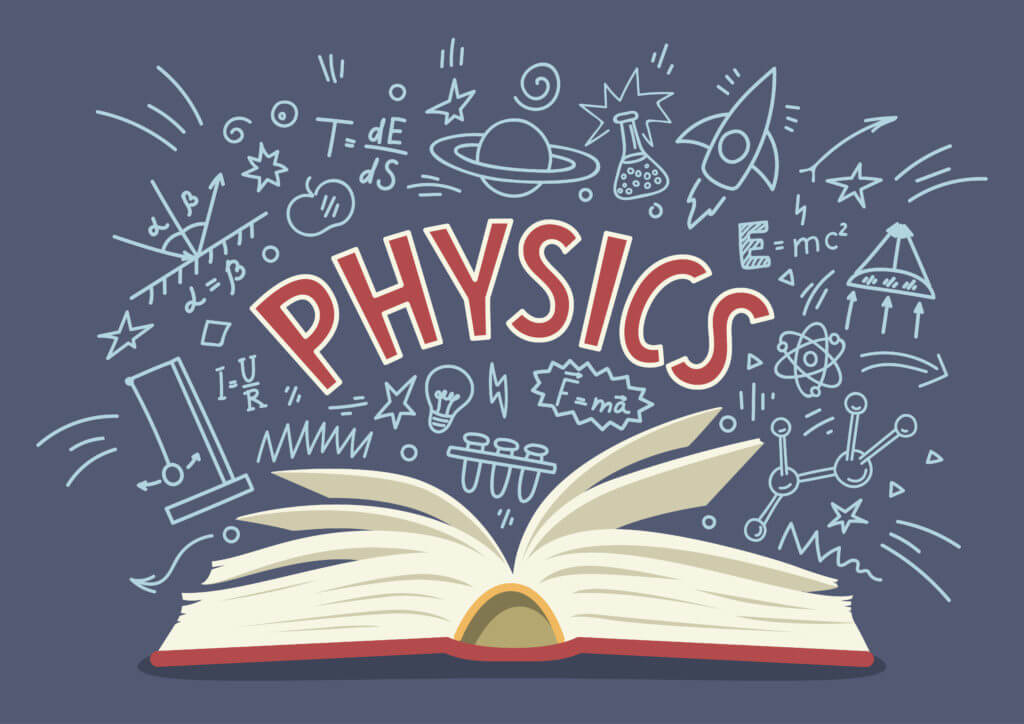The study of Physics is responsible for the theories and discoveries that have led to the exploration and development of microwave appliances, transistor radios, computers, and communications systems. Physicists study how forms of energy and matter interact as well as study the origin of the universe.
Moreover, they perform experiments and design equipment using lasers, electron microscopes, and particle accelerators. They explore the fundamental properties and principles that govern matter, space, time, and energy. Indeed, being a physicist leads you to the vast beauty and mysteries of the universe.
If you are interested in furthering your education with a Ph.D. in Physics, it can be quite challenging because most courses require on-campus laboratory activities or exercises. There are quite a few educational institutions that offer a hybrid learning format for students who are interested in enrolling in a Ph.D. Physics degree program.
Also, some schools or universities allow students to take up the set of coursework through online learning at their convenience and flexibility. However, their on-campus presence is required, especially when they need to complete activities.
What schools offer a Doctor of Philosophy in Physics degree?

The following schools offer a Ph.D. in Physics degree program with the opportunity to take online courses at the discretion of the university while taking up on-campus laboratory activities: Ohio University in Athen, Ohio, Michigan Technological University in Houghton, Michigan, University of Colorado-Colorado Springs, University of California-Berkeley, and Clark University.
Are you inspired by the works and discoveries of Albert Einstein? Ever wondered if Stephen Hawking’s multiverse theories are true? Never give up on your dreams to earn a Ph.D. in Physics, and who knows it’ll be the road to mankind’s amazing new discoveries.
Best Doctor of Physics
Ohio University

Program Standouts:
The Department of Physics & Astronomy at Ohio University offers a top Doctor of Philosophy degree program. The program combines coursework with the completion of a scholarly piece of research that is original in content and presented as a dissertation. Research activities in the Department include:
- astrophysics,
- condensed matter and surface sciences,
- nuclear and particle physics
- and biophysics.
Campus Location: Athens, Ohio
Accreditation: Higher Learning Commission
Admission Requirements:
- Bachelor’s Degree in a related field
- Minimum 3.0 GPA
- Recommended coursework
- GRE
- Transcripts
- Letters of Recommendation
- Resume or CV
- Statement of Purpose
Course Sample:
- Thermal Physics
- Electricity and Magnetism 2
- Mathematical Methods in Physics
- Electronic Device Physics
Degree Outcomes: Graduates in Physics are prepared to teach at a university or college level as well as pursue a career in industry or government.
LEARN MORE ABOUT THE PHD IN PHYSICS FROM OHIO UNIVERSITY
Michigan Technological University

Program Standouts:
The Department of Physics at Michigan Technological University is looking for “highly motivated, inquisitive students with undergraduate majors in physics, materials science, mathematics, or engineering, who possess a strong interest in research.”
Students in the Ph.D. program in Physics prepare for a career in research and development, industry, or academia. With state-of-the-art lab facilities and many opportunities for original research, Michigan Technological University is a dream university for those who love the subject of Physics.
Campus Location: Houghton, Michigan
Accreditation: Higher Learning Commission
Admission Requirements:
- Student Statements
- Official Transcripts
- Admissions Tests
- Letters of Recommendation
- Resume
- Writing Sample
- Previous Degrees
Course Sample:
- Classical Mechanics
- Electrodynamics I
- Mathematical Physics
Degree Outcomes: Graduates with an advanced degree in physics from Michigan Technological University work in academia, industry, and government laboratories.
LEARN MORE ABOUT THE PHD IN PHYSICS FROM MICHIGAN TECHNOLOGICAL UNIVERSITY
University of Colorado – Colorado Springs

Program Standouts:
The University of Colorado – Colorado Springs offers one of the top Physics PhD programs in the country. Graduate students in the PhD program are involved in active research and have ample opportunity for study which puts them at the forefront of physics
Campus Location: Colorado Springs, Colorado
Accreditation: Higher Learning Commission
Admission Requirements:
- Bachelor’s degree in biological sciences, mathematics, physics or equivalents
- Undergraduate GPA of at least 3.00
- Transcript of all previous graduate and undergraduate work
- 3 letters of recommendation
- Goal statement
- Interests that fit with the department’s research directions
Course Sample:
- Theoretical Mechanics
- Quantum Mechanics
- Nonlinear Physics
- Modern Optics
Degree Outcomes: Students who graduate from the Ph.D. program in Physics at the University of Colorado – Colorado Springs will be equipped to work as:
- Physicists,
- Physics Teachers,
- Engineers
- or in other related careers at the very top of their field.
LEARN MORE ABOUT THE PHD IN PHYSICS AT THE UNIVERSITY OF COLORADO – COLORADO SPRINGS
University of California Berkeley

Program Standouts:
The Ph.D. program in Physics at the University of California Berkeley is unquestionably one of the best in the nation. Currently ranked by ‘U.S. News and World Report’ as #3 in the nation, UC Berkeley’s Physics program is one of the very best Physics programs in the world.
Campus Location: Berkeley, California
Accreditation: Western Association Schools and Colleges Commission on Colleges
Admission Requirements:
- Evidence of English Language Proficiency
- GRE
- Letters of Recommendation
- Other Doctoral Degree Requirements
Course Sample:
- Classical Electromagnetism
- Quantum Mechanics
- Equilibrium Statistical Physics
LEARN MORE ABOUT THE PHD IN PHYSICS AT THE UNIVERSITY OF CALIFORNIA BERKELEY
Clark University

Program Standouts:
The Ph.D. program in Physics at Clark University is experimental and theoretical in design. Emphasized in the program are condensed matter physics, biophysics, and active learning – with research starting in the first semester of the program.
The small size of the program at Clark, along with the access that students have to equipment is unique and builds an independent and collaborative work/study environment.
Campus Location: Worcester, Massachusetts
Accreditation: New England Commission of Higher Education
Admission Requirements:
- Application form and fee
- Personal Statement
- Letters of Recommendation
- Resume
- Academic Transcripts
- Test Scores
Areas of study include:
- Active matter
- Soft matter
- Soft robots
- Physics of thin structures
- Organic superconductivity
- Novel magnetic materials
Degree Outcomes: Doctoral alumni from Clark University are “well-prepared to obtain fulfilling positions in:
- education,
- government,
- scientific
- research, and more.
LEARN MORE ABOUT THE PHD IN PHYSICS FROM CLARK UNIVERSITY
Frequently Asked Questions
What does a Physicist do?

Physicists are scientists who study and experiment with motion and gravity, the properties of gases, the structure of matter, different types of energy, and the relationship between energy and matter. They study the fundamental forces and laws of the universe.
Other physicists apply their learning of physics to several forms of matter, such as electrical equipment, missiles, laser beams, medicine, computer development, and many other things related to physics.
Physics is a very broad study of science. With this being said, many physicists specialize in a specific branch, such as a nuclear physicist who mainly studies the nature and structure of atomic nuclei and their interaction with space and matter. Their work has paved the way for the discovery of active components that help the medical field in the diagnosis and treatment of several illnesses.
Astrophysicists deal with the study of the universe, while medical physicists work in healthcare and use their knowledge to develop new medical equipment, technologies, and radiation-based treatments for patients.
Additionally, atomic or optical physicists study the nature and structure of atoms, electrons, molecules, and light that will eventually lead them to the discovery of new materials or technology.
Also, they create scientific theories and methodologies that explain the force of gravity, the formation of sub-atomic particles, and many other principles governing the natural world.
They conduct several scientific experiments and studies to discover the properties of energy and matter and other scientific theoretical discoveries. Physicists write scientific papers that will be published in journals. Also, they present research work at lectures and scientific conferences.
What sort of accreditation should I look for in a school?

The last thing you would want to happen is to waste time and money on a degree that future employers won’t take seriously. With this in mind, you should make sure that your chosen school or university has proper accreditation before you enroll.
Accreditation indicates that your chosen school or university is maintaining a reputable standard as well as continuing to improve and make advancements within its field.
While you don’t necessarily need a program-specific accreditation to earn your physics degree, there are program-specific recognitions if you are hoping to use your Ph.D. Physics degree to become a licensed Professional Engineer.
The Accreditation Board for Engineering and Technology, commonly known as ABET, is a non-governmental accrediting agency for programs in applied and natural science, engineering technology, computing, and engineering.
Therefore, choosing an ABET-accredited educational institution is your first choice if you have plans to become a licensed Professional Engineer. It will be an essential credential as you seek employment in a competitive job market.
Lastly, make sure that your Ph.D. in Physics degree program is offered by an institution that is regionally accredited by accrediting agencies, such as:
- The Higher Learning Commission,
- Western Association of Schools and Colleges,
- New England Association of Schools and Colleges,
- Southern Association of Colleges and Schools Commission on Colleges,
- Middle States Commission on Higher Education,
- and Northwest Commission on Colleges and Universities.
What type of degree do I need to pursue research or educate others in physics?

Physicists need a Ph.D. for professional careers in academia and research. Thus, a doctorate-level degree in Physics would qualify to teach in most accredited schools or universities.
Typically, a Ph.D. in Physics degree program requires four to seven years of study. It is the most highly reputable degree in the Physics field. Moreover, those who pursue research work for the university or school have a Ph.D. in Physics. These researchers write scientific papers and research work or dissertations and publish their work as a contribution to the academic field.
What kind of career and salary can I expect from my Ph.D. in Physics?

A Ph.D. in Physics degree program can be the key to several rewarding professional career pathways in physical and social sciences. The four main areas in which Ph.D. in Physics graduates can find employment are:
- colleges and universities,
- government,
- industry,
- and laboratories.
There are numerous careers related to the Physics world such as:
- geoscientists,
- biochemists and biophysicists,
- mathematicians and statisticians,
- materials engineer,
- computer and information research scientists,
- nuclear engineers,
- and teachers.
Those with Ph.D. in Physics tend to compete for permanent research positions since the marketplace for the Physics field is usually strong. Despite the competition, they can apply in applied research, development, and other related technical areas.
The median wage for physicists is $139,220 per year. $63,390 is the lowest earning for a physicist, while $181,5100 is the highest earnings per year.
The top industries for physicists include ambulatory healthcare services ($212,880), scientific research and development ($167,590), the federal government ($129,240), and educational institutions ($87,620).
Most physicists work full-time in well-lighted laboratories and classrooms, while others work outdoors. Besides, some work in hospitals or factories, as well as some of them are in academia, where they teach in the classroom while preparing lesson plans, conducting research and writing for the remainder of their workweek.
How long does it take to earn a Doctorate in Physics?
The amount of time required to earn a doctorate in physics varies depending on the program and the student’s background. Generally, it can take anywhere from 4-7 years to complete a doctorate in physics.
